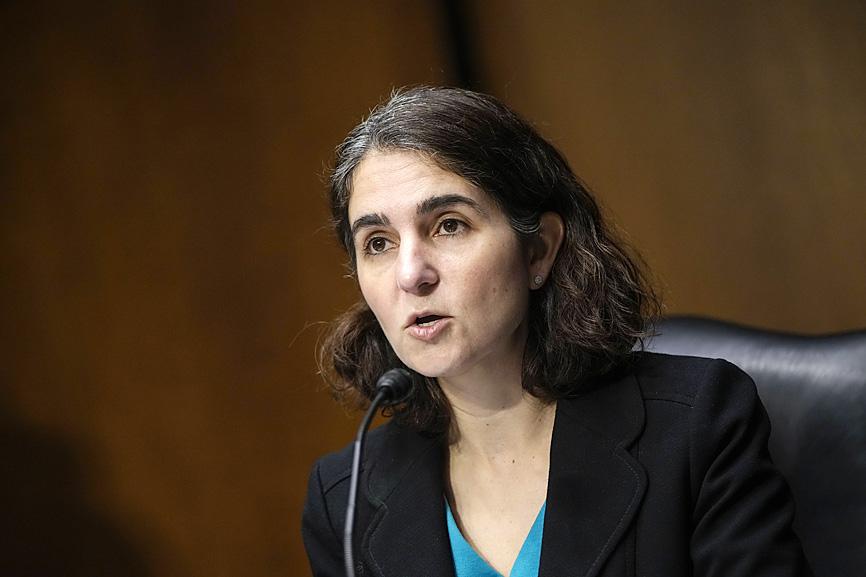A senior US defense official on Thursday told a US Senate hearing that Taiwan should enhance its asymmetric capabilities to defend against an attack by China.
US Assistant Secretary of Defense for Strategy, Plans and Capabilities Mara Karlin said that the war in Ukraine illustrates Taiwan’s need to be prepared.
“I think the situation we’re seeing in Ukraine right now is a very worthwhile case study ... about why Taiwan needs to do all it can to build asymmetric capabilities, to get its population ready, so that it can be ready as quickly as possible should China choose to violate its sovereignty,” Karlin told the US Senate Foreign Relations Committee.

Photo: AFP
She was responding to a question by committee Chairman Bob Menendez, who asked when the last time was that the US Department of Defense conducted an assessment with Taiwan of its defense capabilities and needs.
Karlin said that the US and Taiwan regularly discuss ways in which Washington can help Taipei build a military tailored to the threats it faces.
“It is absolutely a priority to ensure that Taiwan is getting the asymmetric capabilities that it needs, that is most appropriate,” Karlin said.
US Assistant Secretary of the Bureau of Political Military Affairs Jessica Lewis said that to offset China’s military superiority, Taiwan should focus on boosting its asymmetric capabilities, rather than acquiring more conventional military weapons.
Asymmetric systems, which have been used to great effect in Ukraine, are cost-effective, mobile, resilient and decentralized, Lewis said, citing as examples short-range air defense systems, naval mines and coastal defense and cruise missiles.
“Obviously, we don’t want there to be a conflict in Taiwan, but what they are doing is taking steps to address this issue,” Lewis said. “They’ve just created the establishment of an all-out defense mobilization organization, and they are working with our national guard as they develop this program.”
“Our support [for Taiwan] remains rock solid,” Lewis told the committee, which was seeking to learn about the US’ cooperation and assistance on external security, including the threat to Taiwan from China.
In Taiwan, Su Tzu-yun (蘇紫雲), an associate research fellow at the Institute for National Defense and Security Research, yesterday said that Taiwan should leverage cost-effective precision-guided munitions to bolster its counterinvasion asymmetric warfare capabilities.
Affordable precision-guided air-defense and anti-ship missiles would be the key to giving Taiwan an advantage over an invading force, he said.
Although Ukraine has leveraged asymmetric warfare against Russia in a land war, Taiwan would likely have to focus on sea and air engagements, necessitating a different approach to asymmetric warfare, Su said.
Despite the differences, the logic remains the same, in that “the key to asymmetric warfare is the difference in cost,” Su said.
Asked about Karlin’s remarks, a spokesman for China’s embassy in Washington, Liu Pengyu (劉鵬宇), said that some in the US have abetted forces for Taiwanese independence in a bid to hold back China’s rejuvenation.
“This would not only push Taiwan into a precarious situation, but also bring unbearable consequences for the US side,” Liu said in an e-mail.
Additional reporting by Reuters

INVESTIGATION: The case is the latest instance of a DPP figure being implicated in an espionage network accused of allegedly leaking information to Chinese intelligence Democratic Progressive Party (DPP) member Ho Jen-chieh (何仁傑) was detained and held incommunicado yesterday on suspicion of spying for China during his tenure as assistant to then-minister of foreign affairs Joseph Wu (吳釗燮). The Taipei District Prosecutors’ Office said Ho was implicated during its investigation into alleged spying activities by former Presidential Office consultant Wu Shang-yu (吳尚雨). Prosecutors said there is reason to believe Ho breached the National Security Act (國家安全法) by leaking classified Ministry of Foreign Affairs information to Chinese intelligence. Following interrogation, prosecutors petitioned the Taipei District Court to detain Ho, citing concerns over potential collusion or tampering of evidence. The

‘FORM OF PROTEST’: The German Institute Taipei said it was ‘shocked’ to see Nazi symbolism used in connection with political aims as it condemned the incident Sung Chien-liang (宋建樑), who led efforts to recall Democratic Progressive Party (DPP) Legislator Lee Kun-cheng (李坤城), was released on bail of NT$80,000 yesterday amid an outcry over a Nazi armband he wore to questioning the night before. Sung arrived at the New Taipei City District Prosecutors’ Office for questioning in a recall petition forgery case on Tuesday night wearing a red armband bearing a swastika, carrying a copy of Adolf Hitler’s Mein Kampf and giving a Nazi salute. Sung left the building at 1:15am without the armband and apparently covering the book with a coat. This is a serious international scandal and Chinese

Seventy percent of middle and elementary schools now conduct English classes entirely in English, the Ministry of Education said, as it encourages schools nationwide to adopt this practice Minister of Education (MOE) Cheng Ying-yao (鄭英耀) is scheduled to present a report on the government’s bilingual education policy to the Legislative Yuan’s Education and Culture Committee today. The report would outline strategies aimed at expanding access to education, reducing regional disparities and improving talent cultivation. Implementation of bilingual education policies has varied across local governments, occasionally drawing public criticism. For example, some schools have required teachers of non-English subjects to pass English proficiency

TRADE: The premier pledged safeguards on ‘Made in Taiwan’ labeling, anti-dumping measures and stricter export controls to strengthen its position in trade talks Products labeled “made in Taiwan” must be genuinely made in Taiwan, Premier Cho Jung-tai (卓榮泰) said yesterday, vowing to enforce strict safeguards against “origin laundering” and initiate anti-dumping investigations to prevent China dumping its products in Taiwan. Cho made the remarks in a discussion session with representatives from industries in Kaohsiung. In response to the US government’s recent announcement of “reciprocal” tariffs on its trading partners, President William Lai (賴清德) and Cho last week began a series of consultations with industry leaders nationwide to gather feedback and address concerns. Taiwanese and US officials held a videoconference on Friday evening to discuss the